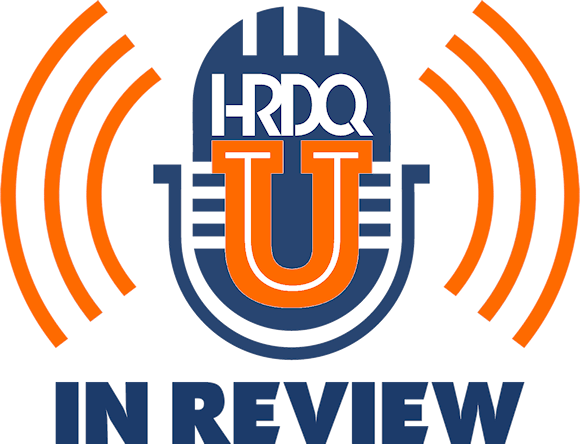
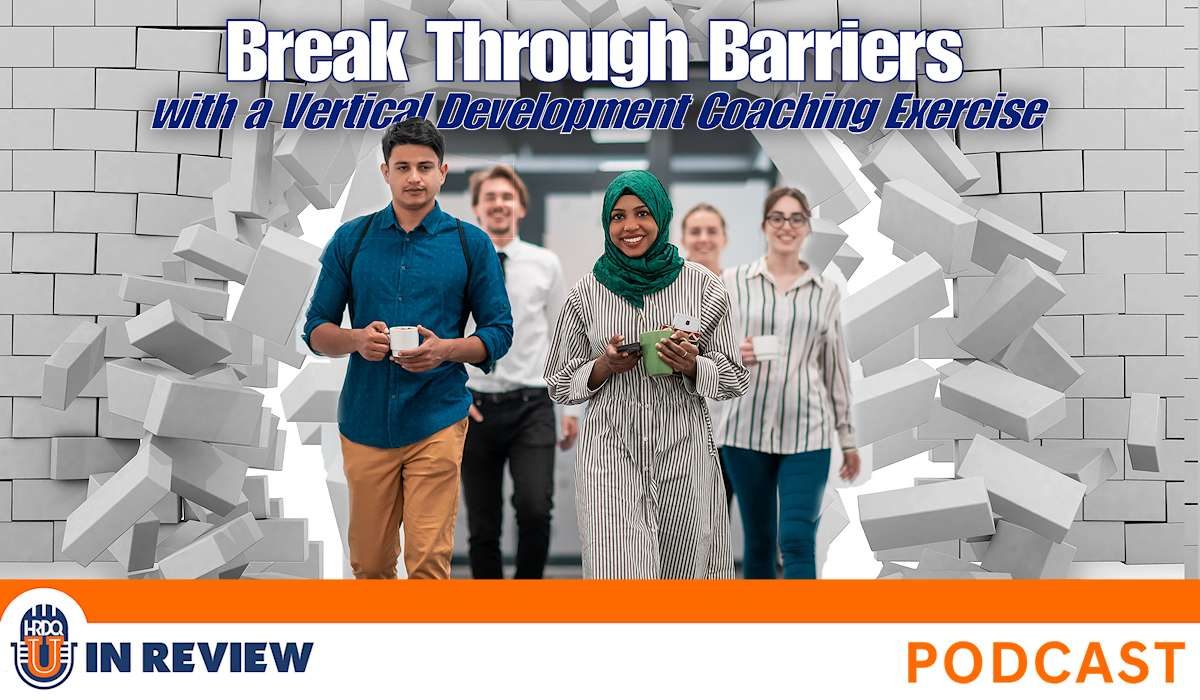
In this episode of the HRDQ-U In Review podcast, host Sarah welcomes leadership expert Ryan Gottfredson to talk about his recent webinar, Break Through Barriers with a Vertical Development Coaching Exercise. Ryan shares insights from his research in organizational behavior and his mission to help leaders grow from the inside out, focusing on mindset, emotional intelligence, and the being side of leadership.
Ryan explains the difference between horizontal development (skills, knowledge) and vertical development (how we make meaning), and why 95% of leadership programs focus on the wrong one. He walks through a powerful transformational leadership coaching exercise that helps leaders uncover hidden fears and self-protective mindsets that block growth – like fear of failure, control issues, or people-pleasing tendencies. Through real-world stories and examples, Ryan illustrates how vertical development can be a transformational process that helps leaders lead with more authenticity, presence, and impact.
Whether you’re an executive, team leader, or coach, this episode offers a deeper understanding of what it means to evolve as a leader. Listeners will walk away with tools and insights to reframe limiting beliefs and become more grounded, empowered versions of themselves through transformational leadership coaching.
Special Offer
Want to help your people get unstuck – or unlock their full potential?
Whether you’re looking to move struggling employees forward or help good leaders become truly great, the key is vertical development – upgrading their internal operating system. We specialize in helping individuals and teams elevate how they think, relate, and lead.
As a special offer for HRDQ-U participants, you’ll receive 50% off a workshop or coaching package designed to catalyze transformational growth. Just mention you attended the HRDQ-U session when you reach out!
Calendly link: calendly.com/ryangottfredson/workwithryan
Chapters
Action Items
00:01
Welcome to this week’s episode of the HRDQ-U In Review podcast, where we bring you the latest insights and practical tools for enhancing soft skills training in your organization. This podcast is brought to you by HRDQU.com, and I’m your host, Sarah, Learning Events Manager at HRDQ-U. Today, we are joined by Ryan Gottfredson to discuss the webinar Breakthrough Barriers with a Vertical Development Coaching Exercise.
00:24
Now be sure to subscribe to our newsletter at HRDQU.com for exclusive updates, upcoming webinars, and resources to help you and your team excel. Ryan, welcome. Thanks so much for joining me today. Hey, thanks for having me on again. This is a lot of fun. And before we dig into today’s topic, can you share a little bit about your background and what drew you to the world of coaching and leadership development? Yeah, well, I would say, I mean, there’s multiple steps along the way, but let me highlight
00:54
that I did my PhD at Indiana University in organizational behavior. I went into that discipline because I wanted to study how to kind of help people become better. And I did my dissertation on leadership and that allowed me to review the last 70 years of leadership research. And I just learned a lot from that. But one of my observations from that was that there’s really only been one primary question asked and answered in the leadership.
01:23
literature over the last 70 years. And that it’s a good question. And it’s led to some good answers. And that question is, what do leaders need to do to be effective? And it’s kind of empowered us now with what we have is essentially a big old long list of boxes that leaders need to check off. And I think that that’s helpful, but only to a degree. But but understanding this, it really didn’t sit very well with me because
01:51
When I think about leadership, I don’t think about leadership as being a box to check off. I think about leadership as becoming a certain type of person. And so over the last 11 years since I graduated with my PhD, that’s been the focus of my research is how do we help, how do we tap into the being side of leadership and how do we help leaders to become these positive influences, these bright lights, these transformational individuals?
02:16
And that’s been the focus of all of my work in terms of my research, my consulting, and my coaching. And let’s talk a little bit about vertical development specifically here. For those that are unfamiliar, can you explain what that means and how it differs from more traditional approaches? Yeah, you’re right. It is a different strategy for developing ourselves than what we’re used to. And I think it’s helpful to understand that there’s two different sides of who we are.
02:44
One side is what I call our doing side. This is our talent, our knowledge, our skills, and our abilities. And when we try to improve our talent, knowledge, skills, and abilities, that’s what we call horizontal development. And that’s most of our development efforts. You think about our school systems, our athletic programs, our organizational development efforts. That’s really all focused on gaining new knowledge and new skills. But there’s another side to us, and that’s what I call our being side.
03:12
Now the being side is the quality and sophistication of our body’s internal operating system. It’s much more aligned with our character, our psyche, our mindsets, our emotional intelligence, and our emotional regulation abilities. And that’s much more about how our bodies are wired to operate. It doesn’t really have to do anything with our knowledge or our skills. And so when we improve along our being side, that’s what we call vertical development.
03:41
And what I’ve learned is that I’m gonna say 95 plus percent of all development efforts focus on horizontal development. And that could be helpful, but generally only incrementally so. But when we focus on the vertical development, now fewer people go down this route just because I think we’re less familiar with it. But if we go down that route, it can be transformational. And that’s the cool thing about helping leaders.
04:06
and employees focus on their being side is we can have a transformational elevated effect on how they think, how they process and how they operate. And for those that weren’t able to attend the webinar, can you share what some of the key takeaways were for our attendees at this event? Yeah, so this is a rather unique webinar. I’ve done several webinars over the last several years. And in this webinar, we invited people to come in.
04:32
and we took them on an introspective deep dive. It was a vertical development exercise and it was designed to help them to uncover two things. One, the mental blocks that are holding them back from their aspirations and then any self-protective mindsets that are driving those mental blocks. And the really cool thing about this exercise is we kind of start at a high level at an aspiration. We dive into the behaviors that hold us back from that aspiration.
05:01
And then we ultimately dive into why do we even engage in those behaviors in the first place? Let me give you a quick example. So a lot of times when I work with leaders, they might come up with an aspiration of I want to become a better or a more strategic leader. Well, what behaviors are getting in your way? Well, a lot of times they will bring up, well, maybe I’m not spending enough time with my people, or maybe I’m micromanaging my people. Well,
05:28
as a coach, I could simply say to them, well, start spending more time with your people and stop micromanaging. But that’s ultimately not gonna be very helpful, because there’s a reason why they’re doing those things to begin with. And so as we dig into the deeper level, so down from the behavior level now into the thinking level, we can uncover some of the fears and commitments that are driving those behaviors. So it’s likely if they’re micromanaging, they have a fear that if they delegate,
05:57
that things will go wrong, they will be viewed poorly, that they’re gonna have to clean up a mess, whatever the fears might be. And so while those fears are justifiable, they’re ultimately fears that are holding them back from their aspirations. And so what I’ve learned by helping hundreds of leaders go through this exercise is that ultimately, if we wanna step more fully into our aspirations, become more of the people that we wanna become,
06:26
We’ve got to uncover our fears and our insecurities. And once we get really clear on those, the good news is, is we could do something about it. We could create a structured plan and a structured system to be able to help us upgrade our mindsets so that we could rise above our fears and our insecurities. And the thing is, is we all have fears and insecurities. So, you know, there’s nothing wrong with having it. We all have them. It’s just to what degree are we aware of those things?
06:54
So it was a really fun workshop because we’re able to kind of take, I think we had 40 to 50 people on there and take them on this deep introspective dive. And as we went through, you could tell light bulbs were going off as they’re awakening to new and different parts of themselves. Yeah. And you mentioned the idea of breaking through internal barriers. What are some common internal barriers that tend to hold leaders back?
07:21
Yeah, one of the things that’s really interesting that I found, so I have a mindset assessment. It’s free on my website at RyanGofferson.com. I’ve had over 50,000 people take this assessment and I use this assessment when I work with organizations. And what I’ve found is that across the organizations I’ve worked with, 60 % of leaders have more of a fixed mindset than a growth mindset. Now, what’s interesting to me about this is if I was to walk into a group,
07:49
of a hundred leaders and if I were to ask them, do any of you have a fixed mindset as opposed to a growth mindset? I’m not sure anybody would raise their hand. But what we, because I think almost all leaders think they have a growth mindset. But what we find is that most leaders actually have a fixed mindset. And the reason why I bring that up is because so what I’ve learned is that when people have a fixed mindset, that what they’ve got going on in terms of their internal barriers is they’ve got fears around
08:19
failing and not succeeding. They’ve got fears around looking bad. They’ve got fears around being viewed as incompetent. Now, when we have these fears and they’re natural fears for leaders because we feel so much pressure to succeed and look good. When we have these fears, it actually drives us to hold on to what’s worked in the past. And we’ve become reluctant to grab ahold of what’s gonna work better in the future. And so what we learn is that when leaders have more of a fixed mindset,
08:48
They tend to be not on the cutting edge, if you will. They tend to be kind of a little bit slower. They fall behind the times. And that’s what we see in their organizations when they’re run by fixed mindset leaders. And so for many leaders in the work that I’ve done with them, that’s been one of the biggest light bulbs that’s come out for them is they have that fixed mindset because it protects them from failing. It protects them from looking bad.
09:15
But at the same time, what they don’t appreciate is it’s holding them back from having the impact that they want to have. And so when they awaken to that, it now gives them the opportunity to shift gears and to ultimately elevate who they are at a very foundational level. And to stay on the topic of mindsets, this exercise pushes leaders to shift their mindset. Why is mindset so critical to leadership growth?
09:42
Well, our mindsets get at the heart of our body’s internal operating system. And our body’s internal operating system is our nervous system, right? So we have senses, have feeling, taste, smell, right? Whenever our senses are continually picking up information, sending it via our nervous system into the base of our brain. At the base of our brain, then our mindsets,
10:07
dictate what information gets into our brain versus what information do we ignore. So that’s the first job of our mindsets. The second job of our mindsets is then if we filter in information, our mindsets second job is to interpret that information in unique ways, such as does my body naturally interpret failure as a bad thing or a good thing? Does it naturally interpret constructive criticism as something that’s dangerous or something that can help me grow? Right? So
10:36
our bodies, our nervous system, and relies upon our mindsets to make meaning of our world. And that’s the most, that mechanism here where we get information into our brain and then interpret that information, that’s the most foundational aspect about our brains and bodies processing. And so if we can improve ourselves at that foundational level, we really can improve everything about how we think, how we process, and how we operate.
11:06
That’s why I love getting at the mindset level is we’re really getting to the root of maybe the hurdles or barriers or beliefs or insecurities that are holding us back. Now for our listeners who have yet to complete the exercise in the webinar, can you walk us through what someone might experience during the exercise and what kind of reflection or realization are they likely to have?
11:31
Yeah, so hopefully you kind of felt that as I kind of walked you through, right? If we have an example of a leader who wants to become a better leader, they’re micromanaging, we need to unpack why that is. So we are all engaging in behaviors that hold us back from our aspirations, right? I can think about even myself as a parent. There’s some things that I’m doing that’s holding me back from my aspirations. Let’s say I get on my phone in the evenings too much, right?
11:59
Well, that’s a behavior that might be getting in the way of me connecting with my children. Well, if I ultimately want to change that behavior, I’ve got to understand why I engage in that behavior in the first place. Well, one of the things that I might feel or one of the reasons why I might be doing that is because I feel like my energy is drained and just kind of mindlessly getting on my phone is a way to kind of, I don’t know, preserve whatever energy that I have left. And that’s a thinking that I have.
12:27
And so ultimately when I uncover that, what I discover is, ah, at my nervous system level, I’ve actually got a fear of losing energy. And so I’m engaging in that behavior as a way to maintain energy. But when I uncover that, then I get to explore, is that fear valid? Is it valid to say that if I spend time with my kids as opposed to get on my phone,
12:54
that I’m gonna deplete my energy. And actually, as I say that out loud, I would say, no, that’s probably not true. I imagine if I engage with my kids, I’ll actually gain more energy as opposed to deplete more energy. Now, every day’s a little bit different. Surely there might be some days where it depletes my energy, but by and large, I imagine that fear is rather unfounded. And when we can uncover these unfounded fears that we have,
13:23
then we could develop kind of experiments to push against those. And we could also, these fears also give us an insight into our mindsets and the quality of our mindsets. And then when we can identify what mindsets might be driving those fears, in this instance, it’s probably an inward mindset, then we could work on developing in this case, more of an outward mindset. So in the course of this process, we get at a deeper level of self-awareness than most people ever go.
13:53
to try to uncover these fears. And as we do so, light bulbs generally go off. I mean, when we uncover some of these limiting beliefs, such as in this instance, if I spend time with my kids, more time with my kids in the evening, then I will deplete my energy, right? When we kind of state it like that, it almost becomes very clear, like, really? Like that’s part of my wiring, but that’s not a…
14:22
you know, an accurate way to kind of think and process through that. So generally it’s a very eye-opening experience and it’s in some ways it’s humbling. But at the same time, it becomes an inflection point for our growth and development, which is the cool thing about it. And in your work, how have you seen this exercise transform a leader’s approach or effectiveness? Man, it, I would, yeah, it’s game changing.
14:52
to help people and leaders come to these different realizations. For example, I’m working with an executive team right now and one of the, I’m working with the CEO and the chairman of the board. And I’ve walked in through this exercise and what’s really interesting is these are very senior leaders and then they’ve got a group of really young leaders in the organization. They are very talented, they’re very knowledgeable, they’re very skillful, but they’re not very experienced when it comes to leadership.
15:21
And what was really fascinating as I was working with the CEO and the board of directors is both of them, what we discovered through the course of this exercise have more of a prevention mindset. So the way that what they came to discover is the way that we are leading this organization is we’re kind of leading in a manner in which I just want to make sure that as little problems happen as possible. And when you’re with a young group of leaders that are inexperienced, guess what?
15:51
Problems are going to pop up and so as a whole this CEO and this the chairman of the board They become wired to focus on avoiding problems with which is justifiable because you know in their mind They’re kind of like I’m getting I’m getting close to retirement. I’m kind of done dealing with crap, right? It’s kind of how they’re feeling but Because they’re so focused on avoiding problems. They are being disconnected from their purpose
16:21
And that, and by being disconnected to the purpose, they aren’t really setting a good example for these younger leaders that they’re wanting to step into these kind of higher level leadership roles. And so that’s been a huge awakening for these two individuals. And they’ve essentially said, I thought, you know, as I got close to retirement, it would mean slowing down. And what they’ve come to realize is actually, if I ever want to retire and have this business be successful, I’ve got to speed up.
16:50
And we’ve got to spend more time mentoring and coaching these younger leaders. And that’s going to be, you know, I’m currently working with them, but that’s going to be game-changing for that organization. And really it’s essential for their organization to thrive beyond the CEO and the board of director or the chairman of the board. And I think it’s safe to assume that some leaders may resist this deeper, more personal kind of a development. How do you recommend coaches or HR professionals introduce it?
17:22
Yeah, and I think that’s one of the things that I like about the exercise is it’s a fairly quick exercise and it’s almost so quick that the guards don’t come up as much. Now guards are gonna come up. And what I found is, okay, I’ve walked well over 100 people through this exercise and I would say probably 10 %
17:50
their guards come up enough that it proves to be a barrier in the exercise. That doesn’t mean we aren’t able to get insights out of it, but the guards come up at least at some point, right? So there’s a question in one part of this exercise where I essentially say, well, what fears are going on here? And I would, you know, there’s 10-ish percent of leaders that’ll kind of sit back, puff out their chest and they’ll say, well, I don’t have any fears. I’m not driven by fear.
18:20
You know, and that always leaves me kind of scratching my head. Is it that you don’t have fears or is that you’re scared to get in touch with your fears? And that’s generally the case, right? So when I sense that I’ve kind of developed some practices to help them to better connect with those fears. But what that’s a signal to me is ultimately that’s a signal that they’re for some reason they’re feeling unsafe. So what can I do as a coach to help them feel more safe?
18:49
And what I’ve also learned is that a lot of leaders who really struggle to get vulnerable is probably connected back to some past trauma in their life. And so it provides a window for me to kind of talk about that. And if they’re open to it, dive into it. So I had one CEO as we were walking through this exercise, he was kind of getting stuck and I explained this and he’s like, okay,
19:19
I’m going to get straight with you.” And I was like, okay, great, let’s do it. And he said, deep down, I don’t really like myself. I said, oh, wow, like that feels really heavy. And I was just said, well, tell me more. And he said, well, when I was a kid, my parents got divorced and my dad moved across the country and I didn’t really ever see him after that. And my mom struggled to make ends meet. She worked two jobs and was rarely around.
19:49
And and I you know, I played sports growing up, but my mom never attended my sporting events and and he said I as a kid I sought after recognition from my mom and I never got it So now as a business leader, I kind of feel like business is the mechanism by which I could get recognition And so that’s what I do. I chase after recognition and I think at the core it’s because deep down I’m not sure I’m
20:19
worth liking and so I need to win in business to be seen as to feel like I’m somebody worth liking. Right. So that you know as I share that that’s that’s some really deep stuff and he didn’t want to go there initially but he got there. But but what I learned is by helping him get there is now we planted the seeds for him to start to heal. And that’s to me one of the most powerful messages about vertical development is at its core.
20:47
Vertical development is about healing our minds, our bodies, and our hearts. And to the degree to which we can do that is the degree to which we can step more fully into the people that we want to become. Yeah. And if a listener wanted to try this exercise themselves or with their team, what’s one tip you’d give them to get the most from it?
21:11
Yeah, well, I think one is feel free to reach out to me. I’d be happy to kind of talk through this and provide support where it can or even train you up on the process. But to let you know where this process, this exercise comes from, it actually comes from a book called Immunity to Change written by Robert Keegan and Lisa Leahy. So they walked through this exercise. They use it in an individual as well as a group level. It’s probably the most powerful and I’m gonna say easy to use.
21:40
vertical development exercise. Now that doesn’t mean it’s an easy exercise, it’s just easier than others. Now I really like the exercise. I actually feel like Keegan and Leahy don’t take it as deep as they could. And so there’s some things that I’ve added on to the exercise to get it to a deeper level, which I found to be almost essential to have the impact that we want to have. if you’re a reader or if you’re a coach,
22:08
and you wanna dive into that exercise essentially from the horse’s mouth, then immunity to change is the place to go. And lastly, Ryan, where can listeners go to connect with you and learn more about your work? Yeah, my website, ryangotfordson.com, you’ll find a host of resources. You’ll see my books, including my new book, Becoming Better, The Groundbreaking Science of Personal Transformation, where we dive into this. There’s some free self-assessments, a personal mindset assessment, a vertical development assessment,
22:38
And then of course you could contact me through the website and if I could support you in developing yourself or developing the leaders and people in your organization, I would love to help you out. Well, thank you, Ryan, for your time today and exploring more of this topic with us. Well, thanks for having me and thanks for creating the space for people like me to come on and share some ideas that hopefully help people become better.
23:02
And we hope you enjoy listening to the HRDQ-U In Review podcast available on all major streaming platforms. If you did enjoy today’s episode, make sure to give us a follow and leave us a five star review. Thank you all for tuning in to this week’s episode of the HRDQ-U In Review podcast brought to you by HRDQU.com.

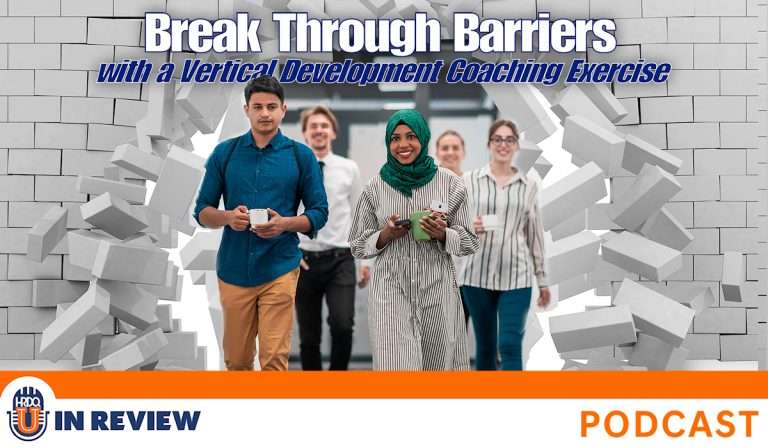
Listen to this podcast event at no charge with your
HRDQ-U Free Access Membership
In this episode of the HRDQ-U In Review podcast, host Sarah welcomes leadership expert Ryan Gottfredson to talk about his recent webinar, Break Through Barriers with a Vertical Development Coaching Exercise. Ryan shares insights from his research in organizational behavior and his mission to help leaders grow from the inside out, focusing on mindset, emotional intelligence, and the being side of leadership.
Ryan explains the difference between horizontal development (skills, knowledge) and vertical development (how we make meaning), and why 95% of leadership programs focus on the wrong one. He walks through a powerful transformational leadership coaching exercise that helps leaders uncover hidden fears and self-protective mindsets that block growth – like fear of failure, control issues, or people-pleasing tendencies. Through real-world stories and examples, Ryan illustrates how vertical development can be a transformational process that helps leaders lead with more authenticity, presence, and impact.
Whether you’re an executive, team leader, or coach, this episode offers a deeper understanding of what it means to evolve as a leader. Listeners will walk away with tools and insights to reframe limiting beliefs and become more grounded, empowered versions of themselves through transformational leadership coaching.
Special Offer
Want to help your people get unstuck – or unlock their full potential?
Whether you’re looking to move struggling employees forward or help good leaders become truly great, the key is vertical development – upgrading their internal operating system. We specialize in helping individuals and teams elevate how they think, relate, and lead.
As a special offer for HRDQ-U participants, you’ll receive 50% off a workshop or coaching package designed to catalyze transformational growth. Just mention you attended the HRDQ-U session when you reach out!
Calendly link: calendly.com/ryangottfredson/workwithryan
Chapters
Action Items
[ PODCAST PLAYBACK ]
You must be signed-in with your membership account to access this content.
Enjoyed this podcast? Have suggestions on how we can improve? Please take our quick survey and receive a coupon for 15% OFF any of our individual membership plans.
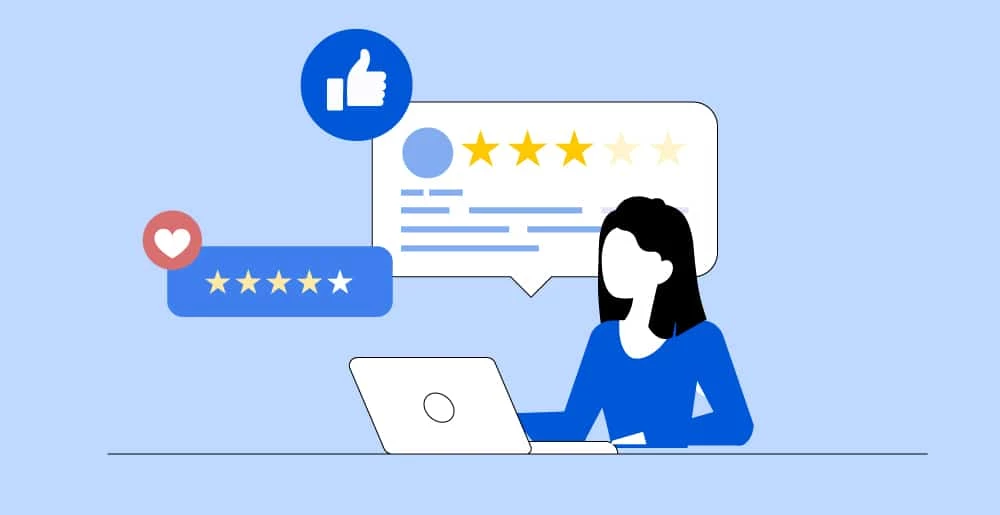
*Instant 15% coupon available upon completion of survey.
Want to learn more? Become an Individual or Corporate member to watch this and hundreds more webinars!
Explore vertical development coaching to enhance your personal and professional growth – transform your mindset and behaviors today.
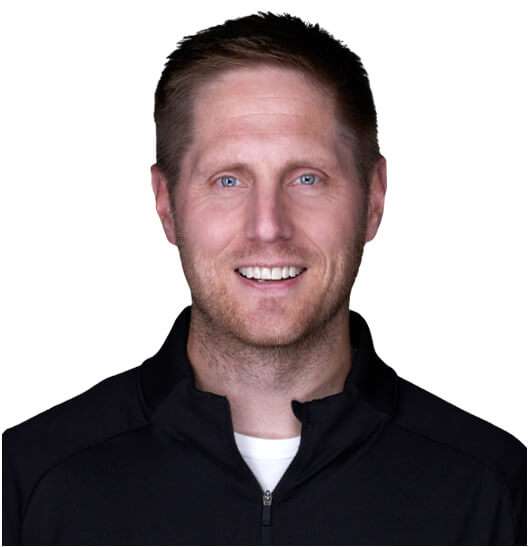
Ryan Gottfredson
Ryan Gottfredson, Ph.D., is a cutting-edge leadership development author, researcher, and consultant. He helps organizations vertically develop their leaders primarily through a focus on mindsets. Ryan is the Wall Street Journal and USA Today best-selling author of Success Mindsets: The Key to Unlocking Greater Success in Your Life, Work, and Leadership and The Elevated Leader: Leveling Up Your Leadership Through Vertical Development. He is also a leadership professor at the College of Business and Economics at California State University-Fullerton.

Training Tools for Developing Great People Skills
This event is sponsored by HRDQ. For 45 years HRDQ has provided research-based, off-the-shelf soft-skills training resources for classroom, virtual, and online training. From assessments and workshops to experiential hands-on games, HRDQ helps organizations improve performance, increase job satisfaction, and more.
Learn more at HRDQstore.com

Mental Models Customizable Courseware
Everyone relies on mental models – internal frameworks that influence how we perceive the world and make choices. Participants will question assumptions, reveal hidden biases, and adjust their thinking to make smarter decisions.
Buy at HRDQstore.com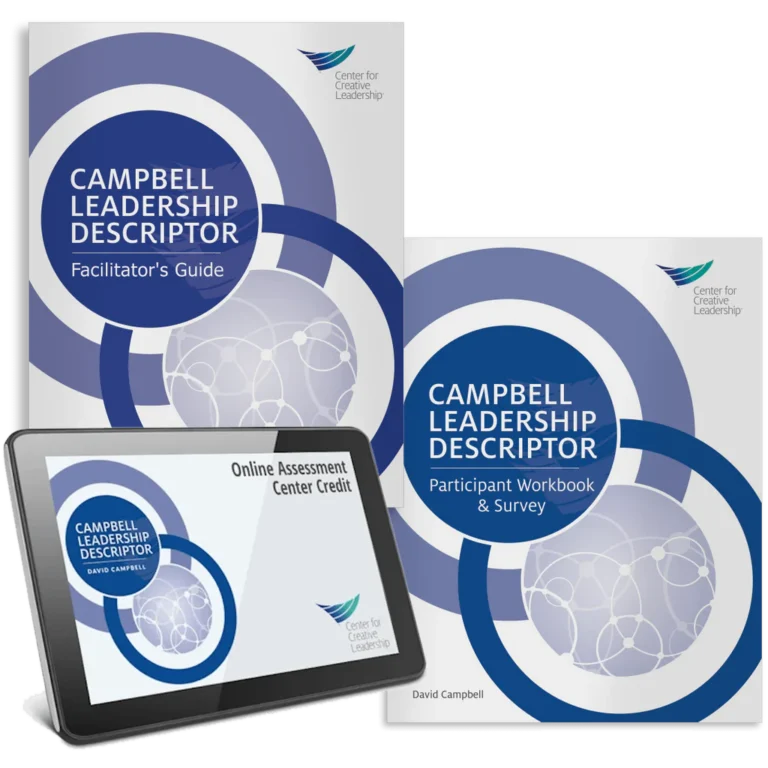
Campbell Leadership Descriptor
Discover the traits of transformational leadership that inspire innovation, foster strong relationships, and elevate team performance. Participants will assess their unique leadership strengths, gain clarity on their personal style, and leave with a customized action plan to accelerate their growth and impact.
Buy at HRDQstore.comThe HRDQ-U In Review Podcast, brought to you by HRDQU.com, brings you the latest insights and practical tools for enhancing soft-skills training in your organization. As a learning community for trainers, coaches, consultants, managers, and anyone passionate about performance improvement, we interview subject matter experts and thought leaders from recent webinars they presented with us to take a deeper dive into the content they shared and answer all your questions. Join us as we explore new ideas and industry trends, share success stories, and discuss challenges faced by professionals.
The HRDQ-U In Review Podcast is intended for HR and training professionals, organizational development practitioners, and anyone interested in improving workplace performance and productivity.
New episodes of HRDQ-U In Review are released every week.
The length of the episodes varies, but they typically range from 15-30 minutes.
The podcast covers a wide range of topics related to HR and organizational development, including leadership development, team building, communication skills, conflict resolution, employee engagement, and more.
No, HRDQ-U In Review is completely free to listen to.
You can listen to any available HRDQ-U In Review Podcast right on our website at HRDQU.com via our embedded Spotify player on the related webinar page. In addition to our self-hosted option, you can find the HRDQ-U In Review Podcast on many of the popular streaming services, which are listed above.
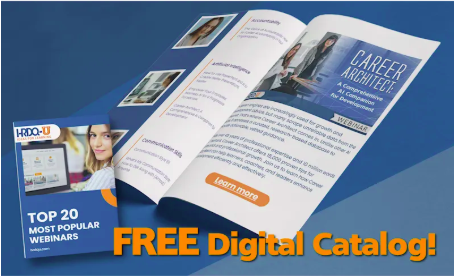
Download our catalog of our top 20 most popular webinars.